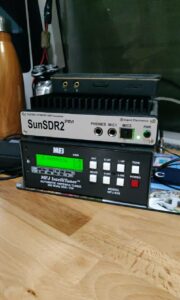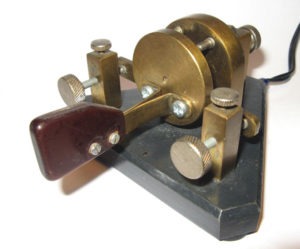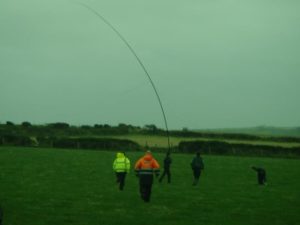Cieľom CQ World Wide 160m Contest-u je pre rádioamatérov z celého sveta je nadviazať čo najväčší počet spojení s čo najväčším počtom rádioamatérov amerických štátov, kanadských provincií a zemí ako je možné v pásme 160m. CW časť sa koná 28.januára 22UT do 30.januára 22UT 2022. Denník je potrebné odoslať do piatich dní od skončenia preteku.
V článku sa dočítate
I. CIEĽ CQ World Wide 160m Contest 2022 CW
Pre amatérov po celom svete kontaktovať ďalších amatérov v čo najväčšom počte štátov USA, kanadských provincií a krajín s využitím pásma 160 metrov.

II. POUŽITIE PÁSMA
1 810–2 000 kHz v regióne ITU 1. 1 800–2 000 kHz v regiónoch ITU 2 a 3. Všetci účastníci sa vyzývajú, aby využili dostupnú šírku pásma pri dodržaní frekvenčných obmedzení a výkonových limitov pre svoju vlastnú krajinu. Akékoľvek porušenie použitia pásma ITU môže mať za následok diskvalifikáciu.
III. KATEGÓRIE
Iba pre kategóriu Single Operator Assisted: je povolené používať jeden remote prijímač, ktorý sa nachádza do 100 kilometrov od hlavného miesta vysielača, okrem prijímača v mieste vysielača. WebSDR sú akceptované, ale musia sa nachádzať v rámci limitu 100 kilometrov. Pravidlo je navrhnuté tak, aby vyhovovalo novým technológiám a pre tým, ktorí majú vysoké hladiny šumu a rušenia v mieste vysielania. Ktokoľvek, kto zistí, že pomocou diaľkového prijímača presahuje limit, bude diskvalifikovaný.
Pre všetky kategórie: Hlavné pracovisko je definované ako všetky vysielače, prijímače a antény musia byť umiestnené na rovnakom pozemku. Ak pozemok nie je súvislý, musí všetko vybavenie byť v okruhu 1500 metrov. Všetky antény musia byť pripojené napájačmi k hlavnej stanici. Toto pravidlo platí pre všetkých účastníkov.
Pre každú stanicu je povolená iba JEDNÁ CQ prevádzková frekvencia. „Flip Flopping“ medzi 2 frekvenciami v rovnakom časovom období (teda využíva 2 frekvencie) je nešportové a bude mať za následok diskvalifikáciu.
Používanie takzvaných „chatovacích miestností“ prostredníctvom internetu alebo podobných prostriedkov na komunikáciu medzi stanicami alebo operátormi počas obdobia konania súťaže je prísne zakázané.
Nezabezpečujte ani nepotvrdzujte spojenia inými prostriedkami ako použitím pásma 160 metrov a rovnakým režimom, aký sa použil v súťaži. Akékoľvek také použitie môže mať za následok diskvalifikáciu podľa uváženia výboru. Použitie sebapozorovania nie je povolené v žiadnej kategórii.
Remote station pre UNASSISTED kategórie je povolené za nasledujúcich podmienok:
- Používanie ktoréhokoľvek prijímača umiestneného mimo hlavnej stránky je prísne zakázané.
- Používanie samostatného prijímača na mieste diaľkového ovládania je zakázané.
- Akýkoľvek prijímač pripojený cez internet alebo RF, ktorý sa fyzicky nenachádza na hlavnej stránke, je prísne zakázaný.
- Ak je remote station umiestnená v inej entite DXCC, musí sa dodržiavať všetky miestne právne predpisy.
Prevádzková doba: CQ World Wide 160-Meter Contest má dĺžku 48 hodín a začína o 2200Z. Stanice s jedným operátorom môžu pracovať iba 30 z 48 hodín. Stanice s viacerými operátormi môžu pracovať 40 hodín. Čas neaktivity musí byť pre všetky kategórie minimálne 30 minút.
(A) Jeden operátor: Jedna osoba vykonáva všetky prevádzkové, logovacie a spotovacie funkcie. Maximálna prevádzková doba je 30 hodín. Pomoc s vyhľadávaním QSO NIE JE povolená * (pozri definíciu nižšie). V každom okamihu je povolený iba jeden vysielaný signál. Maximálny výkon je celkový výkon 1 500 W.
(B) Jeden operátor / Nízky výkon: Rovnaké ako (A), s výnimkou, že výstupný výkon nesmie prekročiť 100 wattov. Stanice v tejto kategórii konkurujú iba iným nízkoenergetickým staniciam.
(C) QRP: Rovnaké ako (A) s tou výnimkou, že výstupný výkon nesmie prekročiť 5 wattov. Stanice v tejto kategórii súťažia iba s inými stanicami QRP. Poznámka: Všetky stanice QRP môžu používať QSO pri hľadaní pomoci.
(D) Jeden operátor / vysoký výkon: Rovnaké ako (A) s týmito výnimkami: Je povolené použitie QSO pri hľadaní pomoci. Je povolené použitie jedného a iba jedného vzdialeného prijímača do 100 kilometrov od miesta vysielača.
(E) Jeden operátor / nízky výkon: Rovnaké ako (D) s nasledujúcimi výnimkami: Výstupný výkon nesmie presiahnuť 100 wattov.
(F) Multi-operátor: LEN VYSOKÝ VÝKON. Všetky pravidlá platia ako v Single Op Assisted (okrem remote prijímačov – NIE SÚ povolené); do prevádzky je však zapojených viac ako jeden operátorov (osôb). Maximálna prevádzková doba je 40 hodín. V každom okamihu je povolený iba jeden vysielaný signál. Maximálny výkon je celkový výkon 1 500 W alebo výstupný výkon povolený vo vašej krajine, podľa toho, ktorý z nich je nižší.
* Pomoc s vyhľadávaním QSO: je to využitie akejkoľvek technológie alebo iného zdroja poskytujúceho operátorovi volaciu značku alebo multiplikátorovú identifikáciu signálu. Patrí sem okrem iného aj použitie CW dekodéra, DX clustra, DX spotovacích webových stránok (napr. DX Summit), miestnej alebo vzdialenej volacej značky a technológie frekvenčného dekódovania (napr. CW skimmer alebo Reverse Beacon Network), alebo prevádzkové dojednania týkajúce sa ďalších jednotlivcov.

IV. VYMIEŇANÝ KÓD
RS (T) a štát pre USA, provincia pre Kanadu a CQ Zone pre DX. Poznámka: Zóny sú iba indikátory polohy a nepočítajú sa pre násobiče.
V. NÁSOBIČ
USA: (48 susediacich štátov); Americký okres Columbia (DC) (1)
Kanadské provincie: (14) VO1, VO2, NB, NS, PEI (VY2), VE2, VE3, VE4, VE5, VE6, VE7, VE8 (NWT), VY1 (YUK), VY0. Poznámka VO1 a VO2 sú z dôvodu tradície oddelené.
DXCC plus krajiny WAE: WAE: GM / Shetlandy (Shetlandské ostrovy), IG9 / IH9 (africké Taliansko – ostrovy Lampedusa a Pantelleria), IT, JW (Medvedí ostrov), TA1 (európske Turecko), 4U1VIC (medzinárodné centrum vo Viedni), Z6 (Kosovo).
VI. BODY
Kontakty so stanicami vo vlastnej krajine: 2 body.
Kontakty s ostatnými krajinami na rovnakom kontinente: 5 bodov.
Kontakty s inými kontinentmi: 10 bodov
Námorné mobilné kontakty majú 5 bodov. Pre námorný mobilný kontakt neexistuje hodnota multiplikátora.

VII. SKÓRE
Všetky stanice – konečné skóre je výsledkom celkového počtu QSO bodov vynásobeného súčtom všetkých násobičov(štáty, provincie VE, krajiny DX).
VIII. DIPLOMY
Diplomy sa budú udeľovať všetkým prihláseným. Sú k dispozícii na stiahnutie a nachádzajú sa tu: <https://cq160.com/scores.htm>
Trofeje sa budú udeľovať najlepším strelcom v mnohých kategóriách. Trofeje a darcov pre všetky kategórie nájdete tu: https://cq160.com/plaques.htm>
Ak máte záujem sponzorovať plaketu, kontaktujte nás na adrese: <questions@CQ160.com>.
IX. KLUBOVÁ SÚŤAŽ
Do klubovej súťaže sa môže prihlásiť ktorýkoľvek klub, ktorý predloží najmenej tri denníky. Názov klubu musí byť zreteľne uvedený v rámci klubovej súťaže na súhrnnom liste alebo súhrnnej časti denníka Cabrillo. Uistite sa, že všetci účastníci z vášho klubu používajú v klube Cabrillo rovnaký názov klubu (napísaný rovnako). Väčšinu názvov klubov nájdete tu: <https://cq160.com/clubnames.htm>
Nedodržanie tejto požiadavky môže viesť k tomu, že vaše skóre nebude pripísané Vášmu klubu.

X. POKYNY PRE LOGOVANIE
Uzávierka odoslania denníkov je 5 dní od skončenia súťaže.
Pre CW je to 2200z 4. februára 2022.
Pre SSB je to 2200z 4. marca 2022.
Vyžaduje sa predloženie logu vo formáte Cabrillo. Prihláste prosím denníky súťaže CQ WW 160 Meter Contest pomocou nástroja na nahrávanie z webu, ktorý sa nachádza na adrese: https://cq160.com/logcheck/
Papierové / diskové denníky: Papierové denníky alebo iné formáty ako Cabrillo už nie sú akceptované na vyhodnotenie.
V prípade ťažkostí, ktoré si vyžadujú viac času na odoslanie protokolu, pošlite e-mail na adresu <director@CQ160.com>. Vyvinieme všetko úsilie, aby sme vám vyhoveli, ak máte oprávnený dôvod na meškanie.
Cabrillo formátované protokoly prijíma robot na spracovanie protokolov. Ak bol váš denník odoslaný správne, robot odpovie potvrdením. Ak sa vyskytne problém s vašim protokolom, robot vám pošle chybové hlásenie s návrhmi, ako protokol opraviť. Pozorne si prečítajte tento e-mail. Väčšina problémov s odoslaním denníka je drobných a je možné ich opraviť jedným klikom. Zadajte svoj denník toľkokrát, koľkokrát je potrebné. Posledným odoslaným denníkom bude verzia, ktorá sa počíta pre váš oficiálny záznam. Stav svojho denníka môžete skontrolovať na našej webovej stránke na karte Prijaté denníky. Ďalšie otázky možno zasielať na adresu <questions@cq160.com>.

XI. SANKCIE A DISKVALIFIKÁCIA
Denníky budú podrobené krížovej kontrole a strhnutia skóre budú realizované podľa uváženia vyhodnocovateľa za kontakty, ktoré budú považované za nesprávne alebo neprimerané. Zlé spojenie sa odstránia a strhnutie skóre sa uplatní aj v dvoch nasledujúcich spojeniach vo forme bodovej zrážky. Za jedinečné spojenia by sa nemal ukladať žiadny trest, pokiaľ sa to nepovažuje za neprimerané. Denník môže byť vyradený a súťažiaci diskvalifikovaný z dôvodu porušenia predpisov o amatérskom rádiovom vysielaní, nešportovom správaní alebo na základe nadmerného množstva neoverených kontaktov.
Výstupy z krížovej kontroly denníkov, ktoré ukazujú výpočty konečného skóre, budú k dispozícii všetkým účastníkom po zverejnení výsledkov. Rozhodnutia Súťažného výboru CQ WW 160 sú konečné.
XII. VYHLÁSENIE
Odoslaním denníka súťaže CQ 160 Meter Contest a s prihliadnutím na snahy komisie súťaže CQ WW 160 preskúmať a vyhodnotiť tento denník účastník bezpodmienečne a neodvolateľne súhlasí s tým, že: 1) prečítal a porozumel pravidlám súťaže a zaväzuje sa nimi byť viazaný, 2) prevádzku realizoval v súlade so všetkými pravidlami a predpismi, ktoré sa týkajú amatérskeho vysielania podľa povoľovacích podmienok danej krajiny, 3) súhlasil s tým, že záznam v denníku môže byť sprístupnený verejnosti, a 4) súhlasil s tým, že diskvalifikácia a ďalšie rozhodnutia výboru sú oficiálne a konečné. Ak účastník nie je ochotný alebo nemôže súhlasiť so všetkým vyššie uvedeným, účastník by nemal predložiť prihlášku alebo prihlášku len ako kontrolný záznam.
Prameň: originálne podmienky CQ World Wide 160-Meter Contest https://www.cq160.com/rules.htm
